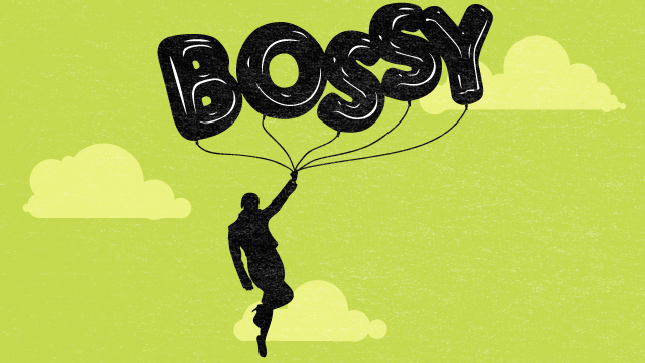You Don't Need to Ban 'Bossy' — You Need to Take Away Its Power
Latest

The word bossy is not a bad word as words go. It can even be kinda great. It’s when someone is aggressive to get shit done. Anyone can be
bossy — go ahead and tell me you’ve never met a bossy guy without a title in
sight. But you don’t need a study to tell you this is a word usually reserved
for women who give orders, who are more likely to be perceived as out of line
or unfeminine when they demand anything. See bossy’s bitchy sister,
“nag.” But there’s only one problem with this word: The people who
use it incorrectly.
That’s right: The problem with bossy is that some people are
full of gender bias and uncomfortable with women in leadership roles, and they
are dino-fucking-saurs, these people who use it only for women when it should
be applied to men and women! Let’s ban them instead.
I’m kidding. Well, only sorta. But consider this: “Ban Bossy” is a campaign
led by a trio of mad-powerful bosses who very well may have been bossy as
children, and that is a good thing: Lean In/Facebook exec/billionaire Sheryl
Sandberg, noted formidable political powerhouse Condoleezza
Rice (so powerful she has TWO Z’s IN HER NAME) and Girl Scouts CEO Anna Maria Chávez. These ladies are a thousand percent correct
and smarter than everyone when they say that, yes, there’s a reason it’s harder
for women to climb to the top, and that reason is loads of hot bias, and the
result is that women are only five percent of CEOs of Fortune 500’s, and that
hasn’t changed in a decade, and it needs to, pronto. And yes, this is a lifelong problem for women, being told they don’t belong at the top with all the $$. From Lindy’s first report on the campaign:
“Ban Bossy,” which they announced
yesterday, is a call for people to strike the “bossy”
descriptor from their vocabularies. Sandberg, Rice, and Chávez argue that the
word is more pejorative than people realize—especially because it’s tacked on
to women to snub them, while men are just praised as “bosses.”
According to Sandberg, Rice, and
Chávez, the problem isn’t just that women and young girls’ feelings are hurt by
the wordage. It’s that they’re often discouraged enough by it that they don’t
speak up or assume leadership roles they’d succeed in. And that hurts
everyone—men and women alike.
But reading about the backgrounds of Sandberg, Rice, and
Chavez, you see a noteworthy lack of effective discouragement. In an interview
over at Parade, we learn that
when a ninth-grade Sandberg was told she was too aggressive and bossy by a
faculty adviser, that, like a straight boss, she ignored it.
Rice, too, had parents who elected her “president of
the family” WHEN SHE WAS FOUR YEARS OLD:
I would call meetings where we’d decide things like
what color to paint the living room. As I got older, I realized that what my
parents were doing was sending messages about leadership
potential.”
Chavez had a unique upbringing that subverted
traditional gender training, too:
“Instead of teaching me how to cook, my mother
taught my brothers
how to cook, and me how to run a board meeting.”
And when I read that, all I think is, EXACTLY. This
is how to raise leaders! Screw the words, raise the ladies right! The answer to mitigating discouragement in girls is to raise women to not give a fuck
about those words, to not be capable of being tripped up by some mega-tool with a
bad vocab. To teach them that hearing words like that is the first sign of gender
bias, which ought to signal them to go full steam the fuck ahead away from that person. It’s called spite, people, and it is a glorious, marvelous motivator.
-

-

-

-

-

-

-

-

-

-

-

-

-

-

-

-

-

-

-

-

-

-

-

-

-

-

-

-

-

-

-

-

-

-

-

-

-

-

-

-








































